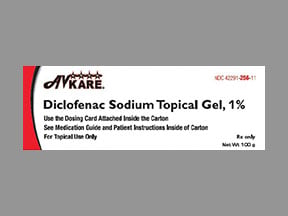
Eq Arthritis Pain Coupons & Savings Card – Discount Prices from $9.65
Brand for: Acetaminophen er
This medication is intended for alleviating mild to moderate pain associated with conditions such as headaches, menstrual cramps, toothaches, backaches, osteoarthritis, as well as aches and pains from colds or the flu. Additionally, it is used to help lower fever.
Our Eq Arthritis Pain coupons are free to use. You can print the coupon, email it to yourself, or receive the Eq Arthritis Pain coupon via text message. To get your free discount, show the pharmacist your Eq Arthritis Pain savings card which has the discounted coupon price. Use our filters below to edit the prescription box to match your needs. The Eq Arthritis Pain prices will update based on your prescription needs. Above our Eq Arthritis Pain coupons, you can change the location to see pharmacy prices in other areas. Our prescription discount card will update online with the specific pharmacy costs associated with your edits. Be sure to text, email, or print the Eq Arthritis Pain savings card code that you need after editing the prescription box and location field. Show the discount card to your pharmacist before paying.
My prescription
Edit
100GM of 1%, Diclofenac Sodium (1 Tube)
Select pharmacy

Albertsons
$9.65
COUPON PRICE
Walgreens
$10.99
COUPON PRICE
Walmart
$19.56
COUPON PRICEEq Arthritis Pain savings card
Show this card to your pharmacist
Albertsons
$9.65
BIN
ID
PCN
GRP
019876
LHEDC216E0
CHIPPO
LHX
Powered by
This medication is intended for alleviating mild to moderate pain associated with conditions such as headaches, menstrual cramps, toothaches, backaches, osteoarthritis, as well as aches and pains from colds or the flu. Additionally, it is used to help lower fever.
Our Eq Arthritis Pain coupons are free to use. You can print the coupon, email it to yourself, or receive the Eq Arthritis Pain coupon via text message. To get your free discount, show the pharmacist your Eq Arthritis Pain savings card which has the discounted coupon price. Use our filters below to edit the prescription box to match your needs. The Eq Arthritis Pain prices will update based on your prescription needs. Above our Eq Arthritis Pain coupons, you can change the location to see pharmacy prices in other areas. Our prescription discount card will update online with the specific pharmacy costs associated with your edits. Be sure to text, email, or print the Eq Arthritis Pain savings card code that you need after editing the prescription box and location field. Show the discount card to your pharmacist before paying.
More prescriptions for rheumatoid arthritis
coupons from$215.01Save 74%
coupons from$17.34Save 52%
coupons from$9.24Save 69%
coupons from$1487.45Save 72%
coupons from$7.93Save 67%
coupons from$9.65Save 78%
coupons from$9.86Save 57%
coupons from$31.58Save 64%
More prescriptions for rheumatoid arthritis
Kineret Save 74%coupons from $215.01
Goodsense Aspirin Adult Low St Save 52%coupons from $17.34
Ft Ibuprofen Minis Save 69%coupons from $9.24
Orencia Save 72%coupons from $1487.45
Aleve Save 67%coupons from $7.93
Aleve Arthritis Pain Save 78%coupons from $9.65
Eq Ibuprofen Save 57%coupons from $9.86
Etodolac ER Save 64%coupons from $31.58
Eq Arthritis Pain (Diclofenac Sodium) dosage forms
Use our Eq Arthritis Pain (Diclofenac Sodium) 100GM coupon with prices from $9.65 for 1 Tube. You can also use our Eq Arthritis Pain (Diclofenac Sodium) 100GM coupon with prices from $11.80 for 2 Tubes. We have a Eq Arthritis Pain (Diclofenac Sodium) 100GM coupon with prices from $13.95 for 3 Tubes. You can use our Eq Arthritis Pain (Diclofenac Sodium) 100GM coupon with prices from $16.10 for 4 Tubes.
Dosage Quantity Price from Per unit 100GM 1 Tube $9.65 $9.65 100GM 2 Tubes $11.80 $5.90 100GM 3 Tubes $13.95 $4.65 100GM 4 Tubes $16.10 $4.03 100GM 5 Tubes $18.26 $3.65
| Dosage | Quantity | Price from | Per unit |
|---|---|---|---|
| 100GM | 1 Tube | $9.65 | $9.65 |
| 100GM | 2 Tubes | $11.80 | $5.90 |
| 100GM | 3 Tubes | $13.95 | $4.65 |
| 100GM | 4 Tubes | $16.10 | $4.03 |
| 100GM | 5 Tubes | $18.26 | $3.65 |
Eq Arthritis Pain FAQs
Using the SaveHealth discount card, what is the price of Eq Arthritis Pain without insurance?
Using the SaveHealth discount card, the price of Eq Arthritis Pain without insurance is $9.65.
What is the price of Eq Arthritis Pain at Walgreens?
The price of Eq Arthritis Pain at Walgreens is $10.99.
What is the price of Eq Arthritis Pain at Walmart?
The price of Eq Arthritis Pain at Walmart is $19.56.
